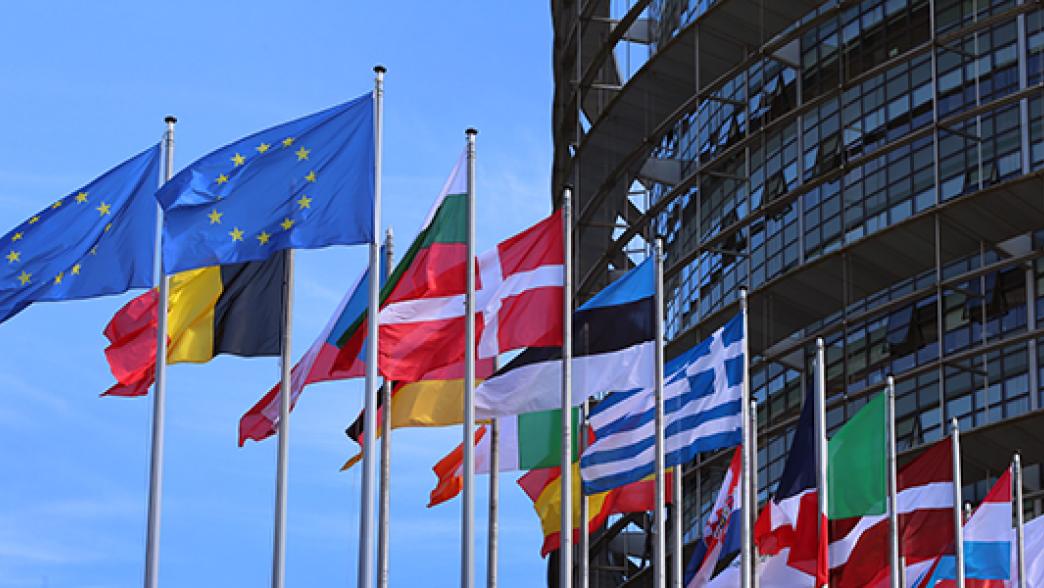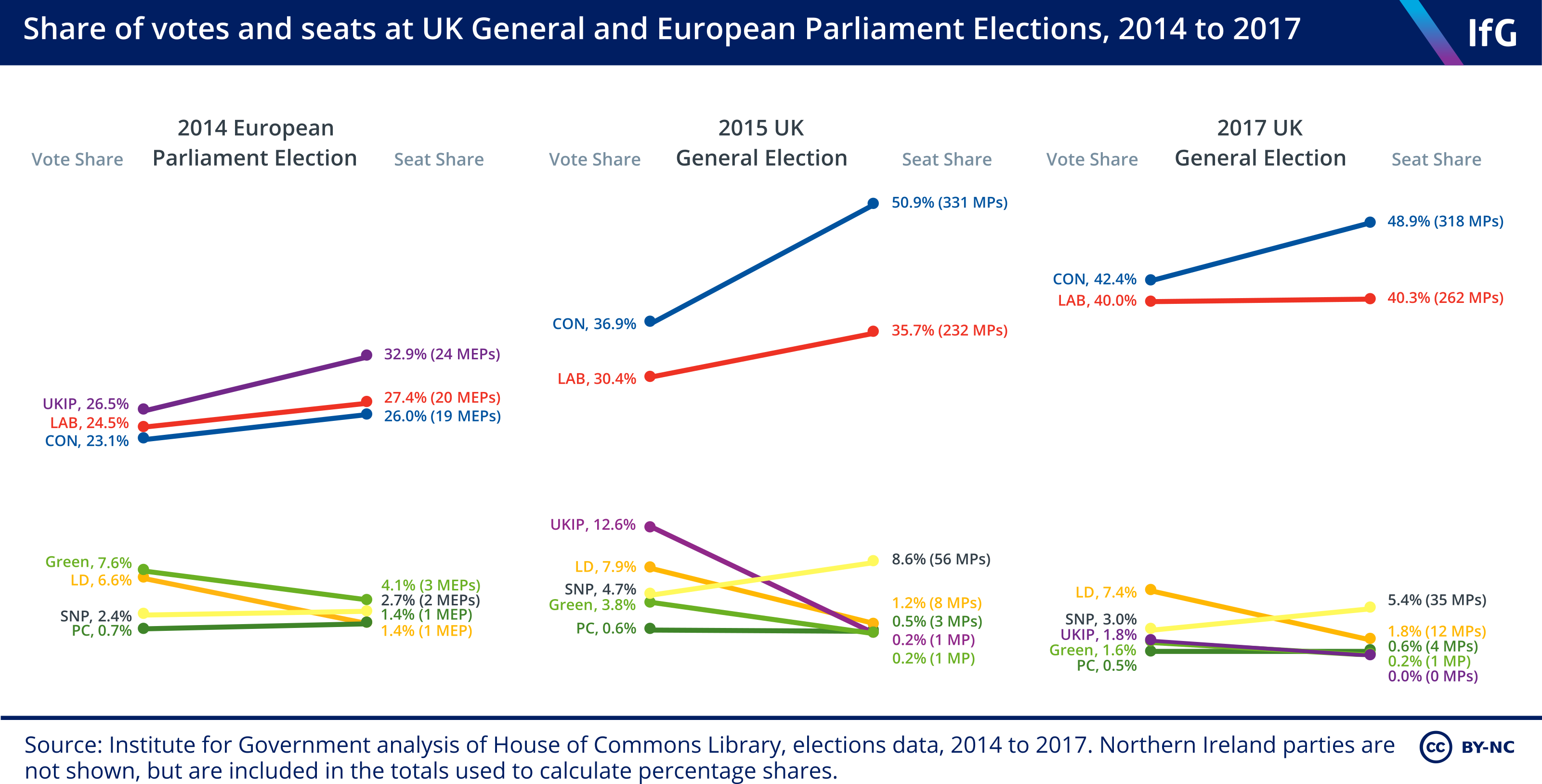
The information in this explainer details the situation at the time of publication and does not reflect possible recent developments.
What is the European Parliament?
In May, EU citizens will go to the polls to elect a new European Parliament. One of the key EU institutions, the European Parliament is responsible for scrutinising the work of the European Commission, including its ongoing negotiations with third countries. It is the only EU institution to be directly elected by EU citizens.
It has several responsibilities:
-
It considers EU legislation sent to it by the European Commission. For over 85 policy areas, the ordinary legislative procedure applies. This means that both the Council of the EU (comprising governments of the 28 member states) and the European Parliament must adopt the legislation before it can come into effect.
-
It signs off the annual EU budget.
-
It must elect EU leaders’ choice of Commission President and hold confirmation hearings for incoming EU commissioners.
-
It also reviews the work of the European Commission.
Currently, the European Parliament is made up of 751 MEPs who are organised into eight political groups. These are not strictly parties, but rather coalitions between MEPs from different countries with similar ideological outlooks. A minimum of 25 members representing at least one quarter of member states are needed to form a group. Not all MEPs belong to a political group – these are known as non-attached members. Each MEP serves for a five-year term. The UK elects 73 of those.
Why would the UK take part in European Parliament elections in 2019?
Both the UK and the EU27 have recognised that delaying the UK’s Brexit date will likely require the UK to hold European Parliament elections.
There are three main reasons for this:
1) EU members states are legally required to hold European Parliament elections. The European Commission could choose to initiate treaty infringement proceedings against the UK for denying UK or EU citizens in the UK the right to vote, or indeed stand, in European Parliament elections. Any attempt to install MEPs without elections could also be subject to challenge in the EU courts.
2) If the UK decided to remain a member state past July but had not taken part in the EU elections, then the new European Parliament – without British seats – would not be able to carry out its activities.
3) Excluding the UK would require treaty reform, which the EU would find hard to agree at very short notice, not least given the need for ratification by member states.
However, if the UK has ratified the Withdrawal Agreement – which requires parliamentary approval – by 22 May, the UK will not need to take part in the elections. If Parliament does not approve a deal by this time and the UK does not hold European Parliament elections, it will have to leave the EU without a deal on 1 June.
Would UK participation make any difference to European Parliament elections?
In June 2018, the EU decided it would reduce the overall number of seats in the European Parliament after Brexit to 705 (down from 751) and reallocate 27 of the 73 UK seats to other EU countries. The plan was for this distribution to be effective from the next European Parliament. If the UK were to take part, the EU would need to halt this reconfiguration.
What is the timetable for the 2019 European Parliament elections?
Voting across other member states will take place between 23–26 May. Results cannot be announced before 11:00pm Brussels time on 26 May to ensure the results in one country do not prejudice votes in another. New MEPs will take up their seats on 2 July.
The EU needs to know by mid-April whether to halt the reconfiguration of seats. On the UK side, the Government has already laid the necessary legislation allowing the UK to take part in the 2019 European Parliament elections on 23 May.
The deadline for registered parties submitting the candidates they want to contest the election to the Electoral Commission is 25 April. Individual parties have their own deadlines for candidates applying to run.
How are MEPs elected in the UK?
The UK is divided into 12 regions: nine in England, and one each for Scotland, Wales and Northern Ireland. Each region has a set number of MEPs, who are elected through proportional representation – although the method differs between Great Britain and Northern Ireland. In England, Scotland and Wales, MEPs are elected using the D’Hondt system within each region. Parties draw up regional lists of candidates which they share with the electorate. The party that wins the most votes can send the candidate at the top of its list to Brussels. The winning party’s vote total is then halved, and the party with the highest tally in the second re-ordered list can send an MEP to Brussels. The process repeats itself until all candidates for the region are appointed.
Northern Ireland uses the Single Transferable Vote system to elect three MEPs. Voters rank candidates in order of preference and once votes have been cast, a quota (the number of votes required to win a seat) is determined. Any candidate who achieves the quota outright will be elected. The lowest ranked candidates are eliminated, and votes are transferred to other candidates.

These different voting systems, combined with the electorate’s tendency to use the elections as a chance to express dissatisfaction with Westminster politics, have meant that candidates from parties that tend to suffer under First Past the Post elections have enjoyed much more success in European Parliameny elections. For example, in 2014, 24 UK Independence Party MEPs – more than other party standing in the UK’s European Parliament elections – were elected.

Who can participate in European Parliament elections?
The EU Treaty makes clear that UK and EU citizens residing in the UK can both stand, and vote, in EU Parliament elections. In the UK, Commonwealth citizens are also eligible to vote.
EU27 citizens who want to vote in the UK rather than their home country have to fill in a European Parliament voter registration form to ensure they do not vote in more than one country.

Turnout in the UK is generally low for European Parliament elections, especially compared to general elections. In 2014, turnout was around 35%.
How much does it cost to hold European Parliament elections?
The Government has published a detailed breakdown of administrative cost of running 2014 European Parliament elections. The total cost of holding the 2014 elections was around £108 million. This includes the cost of returning officers as well as the delivery of candidates’ election leaflets. Political parties spent a total of around £10 million campaigning during the 2014 European Parliament elections. UKIP and Conservatives both spent around £3 million campaigning, while Labour around £1 million. The Green Party spent £0.5 million.
What happens to British MEPs if the UK leaves before the end of the European Parliament?
The 73 British MEPs would cease to be members once the UK has left the EU. It is unclear whether plans for a post-Brexit reconfiguration of the European Parliament would then come into effect before the 2024 European Parliament elections.
Would having UK MEPs (even for a short time) make a difference?
Potentially. In 2014, the EU introduced the spitzenkandidat (lead candidate) process to select the new President of the EU Commission. This meant that rather than simply emerging from discussion in the Council, EU leaders proposed the lead candidate of the biggest parliamentary grouping as the new president of the Commission. Jean-Claude Juncker was nominated under this process as the lead candidate of the European People’s Party.
Most parliamentary groupings have already selected their candidates this time: these include German MEP Manfred Weber for the European People’s Party and Frans Timmermans, the Dutch Vice President of the Commission, for the Progressive Alliance of Socialists and Democrats. No UK MEP would boost the numbers of the European People's Party since the Conservatives left the grouping in 2009, but Labour MEPs would increase the numbers in the Socialists and Democrats. It is possible that this could make a difference to the numbers – but it is also possible that EU leaders could decide to nominate a candidate from another parliamentary grouping or someone other than a designated spitzenkandidat.
- Topic
- Brexit